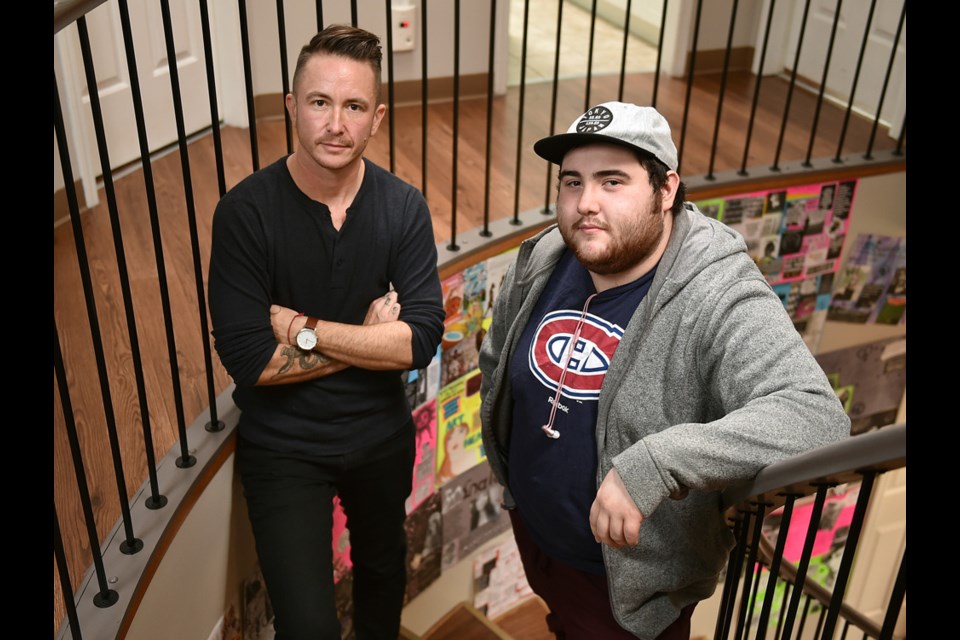For a house full of teenagers, the first thing that strikes you upon entering their nondescript East Side home is the cleanliness.
There’s not a sock on the ground. Beds are made. Waste is all properly sorted.
This isn’t cleanliness for the sake of cleanliness.
Rather, it’s introducing, in some cases for the first time, some semblance of order into lives that have had anything but in them.
Located near the north end of Nanaimo Street, Peak House is in the midst of celebrating its 30th year helping kids between the ages of 13 and 18. In some cases, that help is found through harm reduction or sobriety. In others instances, that help comes via stability.
“This is a home, this isn’t just another facility for services,” Peak House executive director James Kelly told the Courier. “We want to create a home environment. The reason it looks the way it does, the cleanliness, the décor and the art, is because young people deserve this.”
Peak House opened in May 1988, and at the time, was the first facility to offer a youth-focused treatment model in Western Canada. Staffers are choosing to celebrate its 30th anniversary during the week running Nov. 26 to Dec. 2, which coincides with National Addictions Awareness Week.
‘It’s OK not to be OK’
No two visits or treatment models are the same at Peak House, though some common themes emerge. Abstinence is a must while enrolled in the 10-week program and the first two weeks are about orientation and assessment. Kids are taken to recovery meetings to see if those classes are a fit, and a focus is placed on recreation, art, poetry, conversation, music and spirituality.
In some cases, the kids leave sober. But that’s not the be all, end all.
“When they’re here, we’re not just talking about ‘don’t use drugs,’” Kelly said. “We’re talking about what’s going on in their lives that makes drugs the best option. There’s addiction, but there’s other forces at play.”
Cory Oskam, 21, arrived at Peak House four years ago with the stated intention to not be drug free, but in control, and understanding, of why he smoked pot. Oskam identifies as transgender and says he’s lived with mental illness since the age of four. Two shots at the program failed to stick and he left less than a month into both stays. He successfully completed the program on his third attempt.
“Being young and sober is hard,” Oskam said. “For a lot of people who come in here, that’s not how they live. But it’s OK to not be OK.”
Peak House has the capacity to house eight kids at a time and seven beds are spoken for when the Courier visits. The house is operated by BC Housing and funding comes from Vancouver Coastal Health.
More than 20 staff members work at the facility in a range of disciplines: clinical counsellors, nurses, cooks, acupuncturists and an Indigenous cultural coordinator.
After the initial intake process is done, the following weeks entail group and individual therapy, written work and a focus on what life looks like after those 10 weeks. That after-care regimen includes managing cravings, staying connected to family and friends and, in some instances, going to back to their home communities.
But before that happens, clients have to understand why they use the substances they do. They also have to learn to live with up to seven other strangers for more than two months.
“I struggled with [the group setting] a lot,” Oskam said. “There were people I didn’t like and I didn’t get along with. [Kelly] sat me down and said, ‘There are going to be people at work you don’t like. There are going to be people on public transit you don’t like. But you’ve got to be able to work through those emotions.’ Peak House gave me the ability to work through those emotions in a healthy and positive way.”
Intake rates fluctuate throughout the year at Peak House. The beginning of the school year, which typically represents a fresh start for many, is decidedly slow. A month later, it’s usually full. The same goes for the holiday season.
Having been at Peak House for a decade, Kelly has watched the opioid crisis ravage every sector of the population.
“I can’t even call it a crisis anymore. This is just the current reality and it’s scary,” Kelly said.
Given the current level of need, Peak House staff are in the midst of a $300,000 fundraising effort to lay the groundwork for another piece of property in the city. The new house would serve as a continuation of care from the initial 10-week treatment and would be meant for those who aren’t ready to go home, or into the workforce.
As the Courier’s visit wraps up, Oskam is asked how his life is better at 21 compared to before his arrival at Peak House.
“I struggle with emotions,” Oskam responds. “I don’t know them very well, so I had to learn them so I could say, ‘OK, this is how I’m feeling.’ I don’t want to say [life] is better or worse. But I have grown up.”
For info or to donate to the Peak House fundraiser, go to peakhouse.ca or call 604-253-2187.
@JohnKurucz



